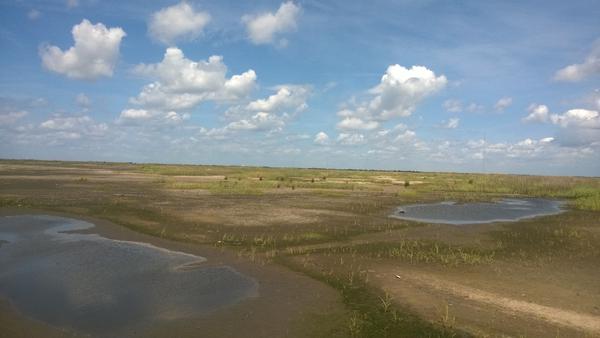Exploring Early Coastal Restoration Funding and Projects
By Estelle Robichaux, Restoration Project Analyst, Environmental Defense Fund
Five years after the BP oil disaster, Gulf Coast communities are still recovering, environmental restoration is still needed, and we will not know the full impacts of the spill for possibly decades to come.
Comprehensive ecosystem restoration of the Gulf cannot begin in earnest until BP accepts responsibility and pays its civil Clean Water Act fines, which could amount to nearly $14 billion. These fines will be used for Gulf Coast restoration, thanks to the 2012 federal RESTORE Act.
Since the spill, however, some funds have been made available for initial restoration projects and research program development. Over a series of blog posts, we will explore some of these funding streams and the restoration efforts they support.
Restoration funding through NFWF
The National Fish & Wildlife Federation (NFWF), a congressionally chartered non-profit organization, was founded as a conservation grant-maker and clearinghouse. In 2013, NFWF established its Gulf Environmental Benefit Fund to administer funds resulting from settlement agreements reached with Transocean and BP in the wake of the 2010 oil disaster.
The terms of these agreements state that Louisiana will receive half of these funds, which total $2.544 billion, over the course of five years for environmental restoration. Specifically, this money is dedicated to barrier island restoration and river diversion projects.
Since NFWF began granting money to the five Gulf states in late 2013, more than $221.1 million has been awarded to Louisiana for seven restoration projects and programs, all of which support our coalition’s priority projects, including:
Caminada Headland Beach & Dune Restoration
Construction on a second phase of the Caminada Headland Beach & Dune restoration project should be underway this April! The engineering, design and permitting of this project, which is part of the Belle Pass to Caminada Pass Barrier Island & Headland Restoration, has been funded and completed.
East Timbalier Island Restoration
The East Timbalier Island restoration project, part of the Timbalier Islands Barrier Island Restoration, has received funding for engineering, design and permitting. The final design and permitting of this project, which has to be completed before it can be constructed, is expected to wrap up in late 2017.
River Diversions
Engineering, permitting and stakeholder engagement for the Mid-Barataria Sediment Diversion has been funded and is underway. Initial planning studies for other river diversions are also being funded, such as the Mid-Breton, Lower Breton and Lower Barataria Sediment Diversions. Planning decisions are currently being made about the Increase Atchafalaya Flow to Terrebonne project and it may be into engineering and design as early as next year.
CPRA’s Adaptive Management Program
Components of the Louisiana Coastal Protection and Restoration Authority’s Adaptive Management program are also being funded by NFWF, including the Barrier Island Comprehensive Monitoring program, the development and initial implementation of SWAMP (System-Wide Assessment and Monitoring Program) and operation of the small-scale physical model.
Restoration funding through NRDA
The Natural Resource Damage Assessment (NRDA) is the scientific and legal process to assess and quantify injuries to natural resources and services following environmental disasters, such as oil spills. The full NRDA process for the Gulf oil disaster may take up to a decade, so in 2011, the NRDA Trustee Council and BP agreed to implement and pay for, respectively, an early restoration program.
BP committed to providing up to $1 billion for early restoration and, so far, the Trustee Council has allocated more than $698.2 million to Gulf restoration projects. More than half of this money has gone to Louisiana for four groups of projects, funding more than $301.7 million in environmental restoration projects.
These restoration projects also support our coalition’s priority projects and include:
Lake Hermitage Marsh Creation
The construction of more than 100 acres of marsh was recently completed as part of the Lake Hermitage Marsh Creation project.
Louisiana Outer Coast Restoration Project
This project includes restoration of four barrier islands, including
- Caillou Lake Headlands, the first component of the Isles Dernieres Barrier Island Restoration, which will restore 1,272 acres.
- Shell Island West and Chenier Ronquille, which are part of the Barataria Pass to Sandy Point Barrier Island Restoration, together include the restoration of over 1,120 acres; and
- North Breton Island, which will restore more than 350 acres of vital bird habitat.
Although construction on these barrier islands has not started yet, at least two of these projects will be out for construction bid within the next couple of months and under construction soon after.
What’s Next?
Although some legal and political issues have limited the pace at which comprehensive Gulf restoration has been able to be initiated, these currently funded projects are important and concrete steps towards restoration of the Mississippi River Delta. Look for our next post, which will delve into the details of one of these projects that is already under construction!
